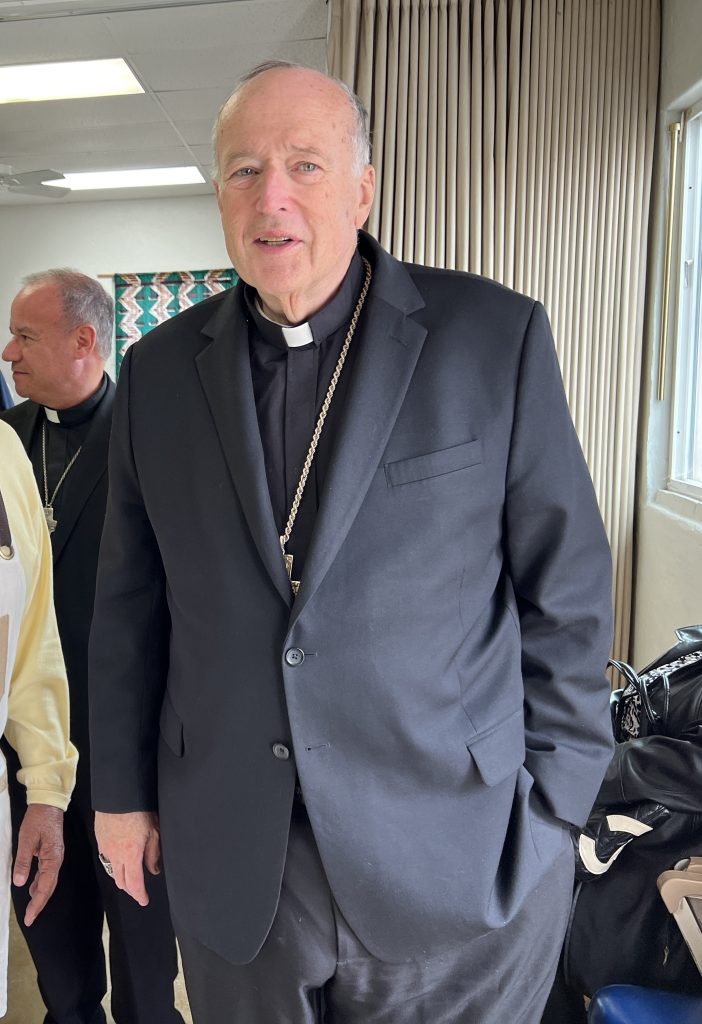SAN DIEGO — In welcoming the Association of U.S. Catholic Priests to the Diocese of San Diego for its 12th annual assembly, Cardinal Robert W. McElroy expressed his appreciation for the organization and its members.
“In the past, when I’ve been present at these assemblies, it’s always an ‘upper,’” he said, “and the reason is because you come together with a sense that something magnificent happened at the (Second Vatican) Council, and it transformed the Church, and it transformed your priesthood, and it transformed the people of God.”
“You are carrying that with you into the current moment in your ministries, in your lives,” he said.
Cardinal McElroy made these remarks during a homily at a vespers service at the University of San Diego on June 12, the first day of the four-day assembly.
On June 14, a local priest was among the recipients of the Pope St. John XXIII Awards, which were presented at a special banquet during the assembly. Father Emmet Farrell, a retired priest of the Diocese of San Diego, was recognized “for promoting the Spirit of Vatican II through his missionary work in Peru, his ministry in bilingual parishes, and his leadership in Creation Care Ministry.” The other honorees were the founders of the Association of U.S. Catholic Priests and the co-directors of Discerning Deacons, an organization that advocates for the ordination of female deacons.
Often seen as being on the ideological left of the Church, the Association of U.S. Catholic Priests includes among its priorities furthering the spirit of Vatican II, opposing racism, fostering nonviolence, combating climate change, and promoting immigration reform, the ordination of women to the diaconate, and mutual support for priests.
Immediately preceding vespers, Deacon Andy Orosco of the Diocese of San Bernardino, a Kumeyaay from the San Pasqual Band of Mission Indians, led a prayer that involved burning sage and praying toward the four cardinal directions. According to Native American tradition, he said, the East, the direction of the rising sun, represents new beginnings and opportunities; the South and the West symbolize youth and adulthood, respectively; and the North signifies “the winter of life.”
In his homily, Cardinal McElroy noted the advanced age of most of the assembly’s attendees, acknowledging that they — and he — are “facing the North.”
“But in the Native American … culture, there was such a great sense of the wisdom that came with those who are facing the North,” he said, “and I welcome you today as men and women who retain the wisdom of your ministries and life in the Church.”
At the same time, he said, those attending the assembly are also people who face the East and the South.
“In this moment, we also face the East,” said Cardinal McElroy. “We are, in a sense, children once again because we are in a synodal Church and in a synodal moment. And thus … a new rebirth” is possible “in the life of the Church.”
The theme of this year’s assembly was “Unity Through Synodality.”
Cardinal McElroy said that, in their early years in ministry, the attendees had encountered laypeople “who would open their souls to us,” sharing their sufferings and struggles. This experience of the “pastoral dimension of the Church” is something that they must not lose.
To the degree that they preserve it, he said, they are also “facing South.”
“I give gratitude that you are here,” said Cardinal McElroy, as he drew his homily to a close. “I give gratitude for all that you have been and done in your lives. I give gratitude for all that you continue to do. And I urge you to see this moment, this synodal moment, as a moment of deep new possibilities for glorious opportunities in the life of the Church and also for a moment in which the pastoral mission of the Church can truly take center stage as the reflection which best enfleshes Jesus’ call to us at the present moment.”









